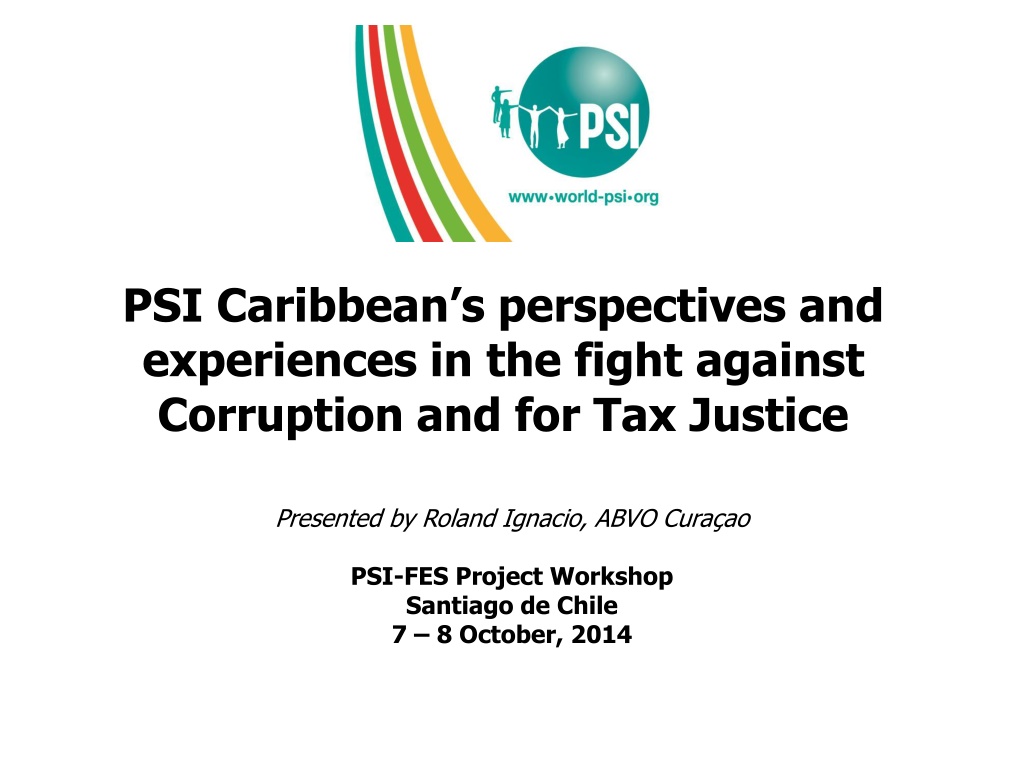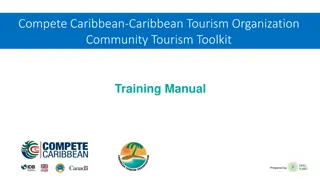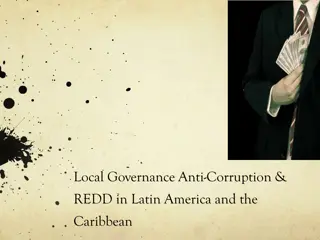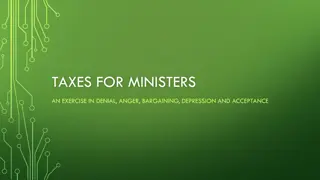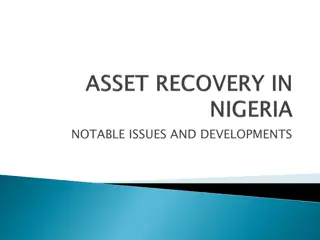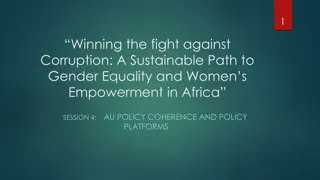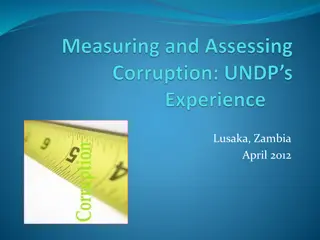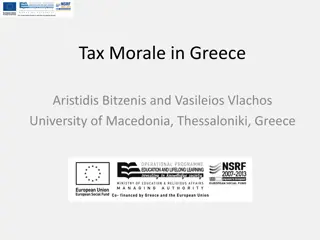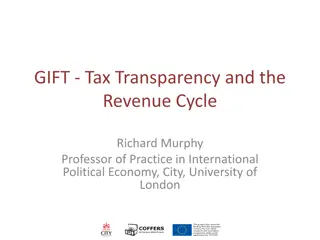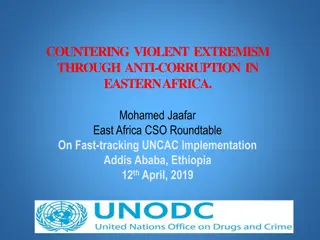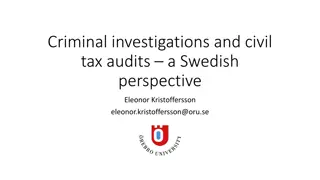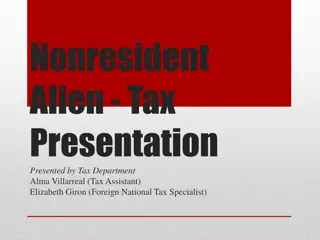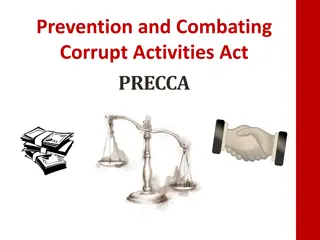Perspectives on Fighting Corruption and Tax Justice in the Caribbean Region
Presented by Roland Ignacio at a workshop in Chile, this content explores the experiences and challenges of Caribbean countries in combating corruption and advocating for tax justice. It sheds light on the demographics, languages, government systems, and sectors represented in the region, emphasizing the vulnerability of these economies to external shocks and natural disasters.
Download Presentation

Please find below an Image/Link to download the presentation.
The content on the website is provided AS IS for your information and personal use only. It may not be sold, licensed, or shared on other websites without obtaining consent from the author. Download presentation by click this link. If you encounter any issues during the download, it is possible that the publisher has removed the file from their server.
E N D
Presentation Transcript
PSI Caribbeans perspectives and experiences in the fight against Corruption and for Tax Justice Presented by Roland Ignacio, ABVO Cura ao PSI-FES Project Workshop Santiago de Chile 7 8 October, 2014
About the sub-region 24 affiliates in 20 countries and territories Population 5,000 Montserrat Caribbean Netherlands Anguilla 10,000 30,000 30,000 50,000 Sint Maarten, Turks & Caicos Islands, British Virgin Islands 50,000 100,000 St Vincent & the Grenadines, Antigua &Barbuda, Dominica, Cayman Islands, St Kitts- Nevis 500,000 1 million Suriname and Guyana 10.7 million Ha ti 100,000 200,000 Cura ao, Grenada, St Lucia, Aruba, US Virgin Islands 200,000 500,000 Guadeloupe, Martinique, Bahamas, Barbados, 1.3 million Trinidad & Tobago 2.7 million Jamaica
Multiple languages (French, Dutch, English, Papiamento, Haitian Creole, Spanish) Government parliamentary democracies and republics, including Independent countries British and French Overseas Territories Countries in the Kingdom of the Netherlands Economies Small, open Highly vulnerable to external shocks Natural disasters and other climate change factors are major threats to growth and sustainability
Representation of workers in the (sub)sectors All affiliates (except CTSP Haiti) represent workers in: Border control and protection (Customs and Immigration) Inland Revenue and other revenue collecting agencies (land tax, licensing, corporate registries, etc) Audit Departments Ministries and departments responsible for public procurement Legal affairs, including lawyers and judges Some also represent workers in Police and Coast Guard Montserrat CSA WICSU-PSU in Sint Maarten * ABVO Cura ao * * Note the responsibilities of the Kingdom for Defence
Gender and age composition 50%+ women in all the (sub)sectors; in some countries, as high as 60% are women Increasing numbers of young women (under 35 years) in Immigration and Customs 35 years and over in other departments, especially at senior levels
Successes, challenges General salary and wage bargaining across the public sector applied to all workers Conditions of service negotiated separately Public sector unions are generally included in national consultations Transition to Revenue Authorities under which all revenue collecting agencies are now grouped Stated intention is to improve collections especially from companies and self-employed professionals (doctors, lawyers, contractors, consultants, etc) New systems of work including new technologies Introduction of finger-printing of staff (especially in Guyana; reason given is for time-keeping) Staff shortages
Fight against corruption 2013 perceptions Index of corruption in public sector of Transparency International Jamaica and T&T, 38 Suriname, 36 Guyana, 27 Ha ti, 19 Other Caribbean countries score above 50
Current concerns Guyana and Trinidad & Tobago Corruption also linked to race and ethnic relations and tensions In T&T, unions fighting against contract nature of judges in the Industrial Court. Situation results in postponement of cases, delays in judgments Recent charges about expenditure for building works not properly completed or on time Guyana has not passed anti-money-laundering bill and has been blacklisted by Caribbean Financial Action Taskforce (CFATF) Jamaica Most recent case relates to public procurement and charges made by the Contractor General regarding multimillion dollar building projects Haiti Long history of various forms of corruption linked to absence of living wages and partisan political pressures especially in relation to public procurement St Maarten and Curacao Recent report highlighting problems related to border control and protection, money laundering drug- and human-trafficking Suriname Long history at highest levels of government linked to arms-trading and drug-trafficking
Big challenges for unions and workers Small countries and communities Fear of victimization Partisan politics No whistleblower protection Unions generally have no clear guidelines or policies on corruption in the public sector and have not trained activists on the issue
Some important questions How to identify target countries for action and campaign? What are the key criteria? What will be the specific role for unions and activists? Who will be our partners?
Tax justice is one aspect of the on-going conversation on high debt, growth and sustainability of Caribbean economies And there are obvious links with anti- corruption activities and campaign
Importance of taxation in the Caribbean 3 main sources of revenue taxation of capital, including physical capital and financial capital taxation of labour taxation on consumption Caribbean countries were always heavily dependent on taxes from customs duties (especially Antigua & Barbuda, Bahamas, Bermuda) With liberalization of trade, this revenue declined substantially Taxation on income and profits has become important in resource- based economies (e.g. Trinidad & Tobago) In service-based countries there is an increase in taxation of goods and services (introduction of VAT in a number of economies VAT and sales taxes have been introduced to make up for shortfall in revenue from customs duties
Tax policies across the Caribbean Include combinations of: Personal income tax Corporate income tax Consumption tax Property tax Taxation of small taxpayers Import tariffs
Income Tax Varied income tax regimes throughout the sub-region Some countries do not levy taxes on personal income (Bahamas, Cayman Islands, Bermuda, St Kitts-Nevis) Antigua & Barbuda, Grenada recently re- introduced income taxes Others levy taxes depending on residency status In some there are flat rates (Belize, Jamaica 25%) In others rates vary according to income levels
Value Added Tax (VAT) revenue Introduced in a number of countries to replace revenue lost from customs and import duties Bahamas will soon introduce VAT Rate (%) 17.5 % of GDP Barbados 10 Trinidad % Tobago Jamaica 15 6 8 16.5 Ha ti 10 4
Total tax revenue as % of GDP Suriname 32 Trinidad & Tobago 29 Barbados 27 Cura ao 26 Dominica 24 Jamaica, Belize 23 St Vincent & the Grenadines, Guyana, Anguilla 22 St Lucia, St Kitts-Nevis 21 Grenada, Antigua & Barbuda, Sint Maarten 18 Bahamas 16 Haiti 13
Tax havens Characteristics of tax havens Nil or only nominal taxes on individuals or businesses. Protection of personal financial information. Lack of transparency. Cayman Islands is the key player in the Caribbean in terms of secrecy and global impact and are (ranked at 4) Cayman Islands and other Caribbean countries are on the gray list There is a potential new PSI affiliate in the Cayman Islands http://www.financialsecrecyindex.com/introduction/fsi-2013-results
Tax havens in the Caribbean FSI 2013 - FINAL RESULTS FSI-Value4 Secrecy Score5 Global Scale Weight6 RANK Jurisdiction Cayman Islands1,2 Bermuda1 British Virgin Islands1,2 Barbados Bahamas1 Belize Aruba2 Curacao2 US Virgin Islands Anguilla1 St Vincent & the Grenadines1 Turks & Caicos Islands1 St Lucia1 Antigua & Barbuda1 Grenada1 Dominica1 St Kitts & Nevis1 Montserrat1 4 1,233.6 70 4.694 14 432.4 80 0.061 20 26 385.4 317.5 66 81 0.241 0.021 35 52 226.9 129.8 80 80 0.009 0.002 55 113.3 71 0.003 58 59 106.4 102.9 77 69 0.001 0.003 61 96.8 76 0.001 62 85.1 78 0.001 63 81.8 78 0.000 65 66.9 84 0.000 67 60.5 80 0.000 70 55.8 78 0.000 77 26.9 79 0.000 80 18.5 80 0.000 82 74
Caribbean Financial Action Task Force (CFATF) Comprises 27 jurisdictions* of the Caribbean Basin which have agreed to implement the international standards for Anti-money Laundering Combating the Financing of Terrorism (AML/CFT) Financial Action Task Force Recommendations (FATF Recommendations) Secretariat is in Port of Spain, T&T *Anguilla, Antigua & Barbuda, Aruba, Bahamas, Barbados, Belize, Bermuda, Cayman Islands, Cura ao, Dominica, Dominican Republic, El Salvador, Guyana, Grenada, Guatemala, Haiti, Jamaica, Montserrat, Sint Maarten, St Lucia, St Kitts-Nevis, St Vincent & the Grenadines, Suriname, Trinidad & Tobago, Venezuela, Virgin Islands
Union action Unions in Jamaica, led by PSI affiliates are part of the national consultations on fiscal reform of the economy including reform of taxation Public sector unions in Bahamas are at the forefront of discussions on the introduction of VAT PSI affiliates in the East Caribbean Currency Union are included in the consultations on fiscal reform and government spending, including taxation issues Some PSI affiliates in CARICOM countries have been invited to be part of the CARICOM Task Force on government procurement (eg NUPW Barbados)
Priorities, future plans Establish sub-regional steering group of key affiliates from the following countries to take lead on tax justice and related issues Jamaica Barbados Trinidad & Tobago affiliates in countries of the OECS* (through the CPSA) ABVO Cura ao * Organisation of East Caribbean States
These are specialist issues requiring specific technical assistance Some technical assistance is available within the sub- region What additional support and technical assistance can PSI offer affiliates?
